2023 WORLD AQUATICS CHAMPIONSHIPS
- July 23 to 30, 2023
- Fukuoka, Japan
- Marine Messe Fukuoka
- LCM (50m)
- WORLD CHAMPS WATCH PARTY – DAILY
- Meet Central
- SwimSwam Preview Index
- Entry Book
- Live Results (Omega)
After eight days of intense racing at the 2023 World Championships, SwimSwam is ranking the top 15 male swimmers of the meet.
Some of these choices were no-brainers. However, others were more difficult to make, and we had to split hairs to decide on the placements of a few swimmers on this list. We understand that not everyone will agree with our rankings, so if you disagree with anything, please feel free to explain why in the comments (in a civilized manner, of course).
These rankings were weighted primarily on individual performances, while other factors like relays and the overall quality of a swimmer’s time were considered.
Now, let’s get started.
Honorable Mention:
- Josh Liendo, Canada (Individual: 1S) — Josh Liendo surprised us early in the meet by missing the men’s 100 free final, but as the meet continued, he got stronger. He made the 50 free final, but ultimately scratched the event to “go all out on the fly.” The move paid off for Liendo. He earned the silver medal in the event, hitting a new personal best of 50.34. The gold-medalist leap-frogged him on the all-time list, but Liendo remains one of the top 100 butterfliers in history, now holding onto the #6 spot. Of course, the swim is also a new Canadian record for him. On the prelims medley relay, Liendo very nearly split sub-50, blasting 50.02 to help Canada qualify for the final, where they eventually placed seventh.
15. Dare Rose, United States (Individual: 1B Relay: 1G, 1B)
Dare Rose was one of many American men who made their first senior international team this summer. Caeleb Dressel not being on his past form presented an opportunity for younger American men, and Rose grabbed it with both hands, qualifying for Worlds in the 50 and 100 butterfly.
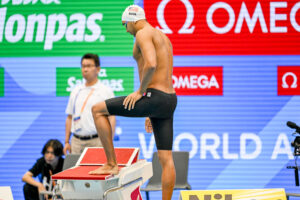
Dare Rose, courtesy of Fabio Cetti
He was the top seed for finals in the 50 butterfly following a massive personal best of 22.79. He couldn’t match that time in the final, and fell out of the medal picture. However, he did what we saw many young swimmers do at this meet after a disappointing first outing–he refocused.
In the 100 butterfly, he was once again the top qualifier out of semifinals, again with a new personal best (50.53). But the ending was different this time. Rose learned from earlier in the week, and had something left to give in the final. There, he swam another best time, 50.46, for his first individual Worlds medal.
Rose won the 100 fly at U.S. Trials, which meant that he was going to be relied on for relay duty. It’s a big responsibility to fill a leg that Dressel usually swims, but Rose handled it well. On the men’s medley relay, he dropped a 50.13 fly split which helped the Americans win gold in a championship record time.
Rounding out the three medals Rose returns to the States with is his bronze from the mixed medley relay. Rose swam fly in prelims (50.50). It’s a very solid debut international for Rose, who’s heading for his senior year at Cal this fall.
14. Hubert Kos, Hungary (Individual: 1G)

Hubert Kos, courtesy of Fabio Cetti
“Honestly I never thought I would swim backstroke, and now here I am, a world champion,” said Hubert Kos after he claimed his first ever Worlds medal by winning gold in the 200 backstroke. “I think it’s just the ‘Bob Bowman effect’ — that’s as simple as it is. I have been training with him for half a year now.”
Kos had never been under 1:57 in the 200 back before this year, when he clocked a world-leading 1:55.95 at the Westmont Pro Series. He fired off a 1:54.14 in the Fukuoka final, dropping over a second from his lifetime best and beating defending champ Ryan Murphy for gold.
The swim was also a new Hungarian record for Kos, his second of the week. Earlier, he’d reset the 100 backstroke record twice, bringing it down to 53.11 by virtue of his seventh place finish in the event.
Perhaps the most impressive part of Kos’ world title is like he said, he wasn’t a backstroker until recently. In fact, he didn’t even race the event last year. Instead, he raced the 200 IM, where he holds the world junior record. If this is what he can do in about six months of training with Bowman, then we’re excited to see what he’ll bring to Paris after 18 months of training at ASU.
13. Tom Dean, Great Britain (Individual: 1S, 1B Relay: 1G, 1B)
In case it wasn’t clear yet: Tom Dean has jaw-dropping closing speed. It doesn’t matter what event he’s swimming–200 freestyle, 200 IM–the 23-year-old is going to close like a freight train. “It’s the same as the 200 freestyle,” he said after the 200 IM. “All the action really happens at the last fifty. The training we’ve been doing, I knew if I explode down that last length, I’ll be able to catch a few people.”
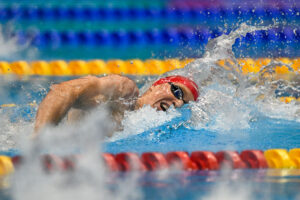
Tom Dean, courtesy of Fabio Cetti
He did catch a few people–in both events. In the 200 freestyle, he split 26.42 on the last lap, moving from fifth to second. He touched just .02 seconds behind his teammate Matt Richards, taking second in 1:44.32, just off his personal best 1:44.22. Then, he was back on the podium in the 200 IM, this time as part of a 2-3 for Great Britain with Duncan Scott.
On the freestyle leg of the 200 IM, he split a massive 27.12–fastest in the field by a second–to move from seventh to third, winning the battle for bronze in a PB of 1:56.07. Dean’s been making consistent improvements in this event for the last year, and now he’s shown that he’s a legitimate medal contender for Paris.
Like the other British men, Dean’s ranking gets hurt by the fact that they were disqualified in prelims of the men’s 4×100 freestyle relay. However, Dean turned in some impressive relay performances. He anchored Great Britain’s gold-medal winning 4×200 freestyle relay in a field-best 1:43.84. He capped off his week by swimming in prelims of the mixed 4×100 free relay, splitting a smooth 47.93.
12. Nic Fink, United States (Individual: 2S Relay: 1G, 1B)
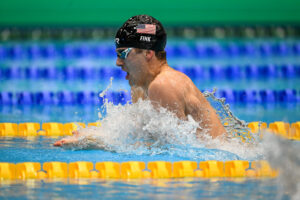
Nic Fink, courtesy of Fabio Cetti
Veteran Nic Fink went all-on on the breaststroke sprints this year. He raced the 200 breast at U.S. Trials but didn’t finish top 2, emphasizing that his focus has largely been on the 50 and 100 breast, which he qualified for Worlds in (with a PB in the 100). While he didn’t swim best times at Worlds, he did walk away with two silver medals.
First, he was a part of the three-way tie for silver along with Arno Kamminga and Nicolo Martinenghi. The three swam 58.72 for their silver medals, about four-tenths off Fink’s best of 58.36. In the 50, he was once again second to Qin Haiyang, taking his second individual medal of the meet in 26.59.
Fink was once again solid on the medley relays. He’s proven that he’s reliable for the Americans and both times, he did what he needed to do, throwing down splits of 58.19 and 58.03 in the mixed and men’s medley relays, respectively.
One thing that will be interesting to track heading into the Olympic year is Fink’s focus. Like we mentioned, he was all in on the sprints this year, but will his priorities shift given that the 50 breaststroke is not an Olympic event?
11. Ryan Murphy, United States (Individual: 1G, 1S Relay: 1G, 1B)
Ryan Murphy has been a staple on the U.S. international team for the better part of a decade. He’s clearly someone the American team relies on, as he’s been named one of the captains for several U.S. teams now.
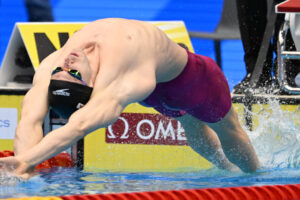
Ryan Murphy, courtesy of Fabio Cetti
Despite all the success he’s had at the international level, until this year he hadn’t won a long-course world title in the 100 back. After finishing second to a surprise winner in Thomas Ceccon (who also broke his world record) last summer, Murphy didn’t let the same thing happen in Fukuoka.
Though we had the same three medallists as 2022, the men’s 100 back podium was markedly slower than last year, when all three men went under 52 seconds. Over the course of the meet, Murphy showed that he had more in the tank than the 52.22. Leading off the mixed medley relay, Murphy cranked out a 52.02, then backed that up on the men’s medley relay with a 52.04.
Murphy also earned silver in the 200 backstroke with a 1:54.83, about three-tenths off the 1:54.52 he went last year to win his long-course world title.
American backstroke depth continues to just get deeper; however, Murphy has proven himself to be able to find a way to get his hand on the wall when it matters. Having now won long-course world titles in his two primary events, he’ll be eyeing Paris confident in his ability to once again reach the top of the Olympic podium.
10. Matt Richards, Great Britain (Individual: 1G, Relay: 1G, 1B)
Matt Richards was one of the biggest breakout stories of the meet. Richards was part of Great Britain’s 4×200 free relay Olympic gold team but had an off 2022, so the big question was how he was going to respond this LCM season after making a coaching change and hitting SCM personal bests.
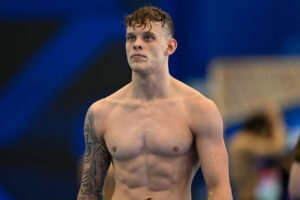
Matt Richards, courtesy of Fabio Cetti
He made at British Trials, where he hit best times in the 50/100/200 free and snagged an individual berth in the 200 freestyle, beating out names like Scott, Tom Dean, and James Guy. With Great Britain’s 200 freestyle depth what it is, this was a big moment for Richards.
He sailed into the 200 free final and when David Popovici tightened up on the last 50 meters, Richards was there. He split 26.53 to pass a fading Popovici and win his first long-course individual world title in a new personal best of 1:44.30. That swim makes him the ninth-fastest performer in history.
Richards got another opportunity presented to him when Scott dropped the 100 freestyle before the meet. That gave Richards another individual event and once again, he seized the opportunity. He broke the British record three times over the course of a day and a half. He lowered the mark all the way to 47.45 and finished fifth in the final, just three-hundredths away from the podium.
To complement his individual efforts, Richards also threw down multiple 46-point 100 freestyle splits, breaking that barrier for the first time in his career. That includes the 46.93 he split on the medley relay to close out the meet, helping Great Britain to a fifth-place finish. His two relay medals come from gold in the 4×200 free (1:44.65 split) and bronze in the mixed 4×100 free (47.83 lead-off), where he and his teammates set a European record.
9. Bobby Finke, United States (Individual: 1 S, 1B)
For the first time, Bobby Finke has walked away from a senior international meet without a gold medal. That doesn’t mean that Finke didn’t have a great meet though; he earned two medals and lowered his own American records in the 800/1500 freestyle with historic times.
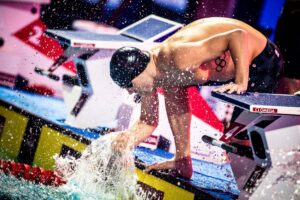
Bobby Finke (photo: Jack Spitser)
In the 800 free, Finke kept to the strategy we’ve seen him use so successfully in the past. He let Lukas Märtens, Sam Short, and Ahmed Hafnaoui take the race out fast, but kept them from getting too far away. Finke made his move at the 700m mark–he caught Märtens, but couldn’t quite close the gap to Hafnaoui and Short. He earned bronze in 7:38.67, breaking the American record he set last summer to win gold.
Despite all the fireworks in the 800 free, for Finke, the real show was in the 1500. It’s also the first time we’ve seen him switch up his strategy. Instead of hanging back and doing it all on the last 100 meters, Finke went with Hafnaoui when he passed Short. Swimming in lanes 3 and 4, the two were inseparable for the rest of the race. Neither could shake the other, not even on the last 50 meters. They barreled towards the wall together, and at the touch it was Hafnaoui who won, with Finke second in 14:31.59, five-hundredths behind.
Yes, he was second, but a 14:31 is absolutely no joke. He and Hafnaoui were about half a second off the world record, and Finke is now the third fastest performer all-time.
8. Cameron McEvoy, Australia (Individual: 1G)
Cameron McEvoy is perhaps the most challenging swimmer on this list to place. He only medaled in one event but boy, that swim was something special.

Cameron McEvoy, courtesy of Fabio Cetti
A year ago, almost nobody would’ve chosen McEvoy to win 50 freestyle gold in Fukuoka; he didn’t race at any major international meets in 2022. At 2023 Australian Trials, he put the world on notice–swimming his first best time since 2016 then bettering it in finals with a 21.27, tying for #10 all-time.
But that was just the warmup act.
We had to wait a long time to see McEvoy in action at Worlds, but he didn’t disappoint. During semifinals, he dropped two-hundredths off his PB, moving up to #9 all time. He then exploded in finals, firing off a 21.06 for the gold. The time makes him #4 in history, and second-fastest in a textile suit. The win marked his first world title, and Australia’s first man to win the event since Michael Klim in 1988.
Additionally, McEvoy won his race by 0.51 seconds, which is the largest margin of victory ever in a men’s 50 free World Championships final. “It’s been a long process. It’s been a long time coming,” said McEvoy. “I’m just so happy to have the privilege to swim and feel like that in the water on such a gigantic stage.”
It’s an incredible comeback story–not only is the 29-year-old McEvoy back on form, he’s better than he ever was.
7. Jack Alexy, United States (Individual: 2S Relay: 1G, 1S, 1B)
Coming into the meet, there was a lot of chatter about the inexperience of the male sprinters the U.S. was sending to Japan. As the 100 freestyle national champion–and therefore, the go-to guy for a majority of the relays–Jack Alexy came into the meet with a lot of responsibility on his shoulders.

Jack Alexy, courtesy of Fabio Cetti
He responded with a vengeance; rebounding after a bad start in the 100 free semis to grab a finals lane by just two-hundredths. Then from lane 8, he leapt out to the lead at the 50-meter mark, and held on in the closing meters for silver (47.31). Newly minted as the second fastest American all-time–behind only Caeleb Dressel–Alexy turned his attention to the 50 freestyle. There, he came away with another silver medal and personal best, hitting 21.57 to finish a hundredth ahead of defending champion Ben Proud.
Not only surprise by coming away with two individual medals, Alexy also played his part well on the U.S. relays. He earned three additional medals, one of each color, in the 4×100 medley, men’s 4×100 freestyle, and mixed 4×100 freestyle relays. And, he only seemed to get better as the meet went on. He split 47.00 in his final swim of the meet in the medley relay, nearly going sub-46 for the first time.
With questions still lingering about Dressel’s form and status, the U.S. has found their new sprint star in Alexy, who has asserted himself as both a medal threat and who can be relied on in the relays.
6. Kyle Chalmers, Australia (Individual: 1G, Relay: 2G, 2B, 1WR)
Of all the incredible things Kyle Chalmers has accomplished throughout his career, the 25-year-old came into this meet with one thing still eluding him: a long-course World Championship gold medal. As he said post-race, “it was the last medal to complete the set in [his] swimming career.”
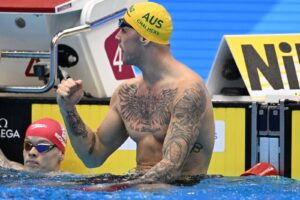
Kyle Chalmers, courtesy of Fabio Cetti
And in Fukuoka, he finally achieved the long-course Worlds gold. Chalmers moved through the rounds easily with 47-mid times. Then, in the final, he unleashed a 47.15 for the win, storming home in 24.11. That’s the fastest he’s swum since the Tokyo Olympics, when he hit 47.08. “To be able to do that tonight in such a stacked field, it was very special,” he added.
Of course, Chalmers is also crucial to Australia’s relays. On the men’s 4×100 free relay, he anchored in a field-best split of 46.56, helping Australia to their first gold in the event since 2011. Next, he helped Australia set a new world record in the mixed 4×100 freestyle relay, bettering the record they’d swum just last summer. He closed out his meet with another sub-47 split on the men’s medley, running down France to get Australia on another podium.
If you were going to play an “event association” game, you’d connect Chalmers with the 100 freestyle. But he’s also capable of throwing down a solid 200 freestyle relay split, which he did on the 4×200 free relay. There, he split 1:45. 19, which is faster than what he split in Tokyo.
With a year to go until Paris, Chalmers has shown that he’s still one of the strongest 100 freestylers on the planet and a lethal card for Australia to use on their relays. He earned just one individual medal, but the strength of his relay splits helps keep him this high on our list.
5. Maxime Grousset, France (Individual: 1G, 2B)
Before the 2022 World Championships, Maxime Grousset had not won any individual medals at a major international meet other than the European Championships. In Budapest, Grousset had a strong outing, collective two individual medals in the sprint freestyle events.

Maxime Grousset, courtesy of Fabio Cetti
He surpassed that this year, in large part due to his new concentration on sprint butterfly. Before this year, the last time Grousset swam a 100 fly was 2018. He swam 52.00 in February, then fired off an unexpected 100 fly French record at the French Championships (50.61). The men’s 50 free and 100 butterfly conflict at Worlds, so Grousset scratched the 50 free–where he was the defending bronze medalist–signaling he was all in on fly.
The decision paid off. He hacked even more time off his personal best (and national record) for his first world title, speeding to a 50.14. That swim makes him the #5 performer all-time. He showed the swim was no fluke in the men’s medley relay, splitting 49.27, which is good for the second fastest split in history, behind only Dressel’s 49.03 split from 2021.
Grousset also collected a pair of bronze medals in personal best times: he clocked 47.42 in the 100 free, winning a tight battle for bronze, and 22.82 in the 50 butterfly.
Understandably, a large spotlight is going to fall on Leon Marchand as the Paris Games approach. But in the pool, Grousset has given France confidence that Marchand won’t be the only individual medalist on the men’s side.
4. Sam Short, Australia (Individual: 1G, 1S, 1B)
19-year-old Sam Short was the first world champion of the meet, as he won the 400 freestyle to kick off the first night of finals. He’d burst onto the scene earlier this spring, producing head-turning times in the 400/800/1500 freestyles. The big question surrounding Short was if he’d be able to replicate those times on the big stage.
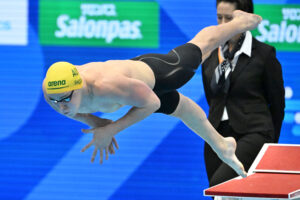
Sam Short, courtesy of Fabio Cetti
Well, the answer was no, he didn’t replicate them–he did better. In the 400 free, he was able to get his head down and outlast Hafnaoui’s long reach for gold in a new personal best of 3:40.68. It was his second PB of the day, as he’d swum a new best to lead the way through prelims. His 3:40.68 makes him the #4 swimmer in the event’s history.
He was back dueling Hafnaoui once again in the 800 freestyle. This time, Hafnaoui was able to out-touch him for gold by .76 seconds, but Short’s 7:37.76 was an impressive time itself–it’s a new Oceanic record and makes the young Australian the #4 performer all-time.
Short had already exceeded expectations at this meet, but he still had one event left: the 1500 free. By his own admission, he “[didn’t] think anyone expected [him] to get on the podium in this one.” But that’s exactly what Short did, earning bronze in a personal best 14:37.28. He took the race out hard, fading back once Finke and Hafnaoui made their move, but he was able to hold onto his spot on the podium.
He and Hafnaoui are both still young, and they’re helping revitalize men’s distance swimming. It seems almost inevitable that we’re going to be treated to many more close races between them.
3. Ahmed Hafnaoui, Tunisia (Individual: 2G, 1S)
Speaking of Ahmed Hafnaoui, he kicks off our top three. His win in the 400 free was probably the biggest surprise of the Tokyo Games, but he didn’t compete at at any of the major long-course international meets in 2022. Since the last fall, he’s been training at Indiana University and we weren’t sure what he was going to have up his sleeve.
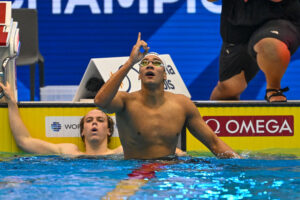
Ahmed Hafnaoui, courtesy of Fabio Cetti
He let us know on the first night of competition when he raced with Short all the way to the wall, cracking a new African record of 3:40.70 in the 400 freestyle and a personal best by almost three seconds.
Short got the better of him in the 400 free, but the 20-year-old Hafnaoui didn’t let that happen again in the 800 free. He had “tried to keep the last race, the 400 in mind, and try to go fast today to take the gold,” he said after the 800 free. So, even though Short had the lead at the final turn, Hafnaoui turned on the jets in the closing meters, coming home in 26.24 for the win (7:37.00) and becoming the third fastest performer in history.
He rode that wave of momentum into the 1500 freestyle, where he broke 15 minutes for the first time in prelims. He hopped out of the pool straight after that swim and barely looked out of breath–a sign that something big was coming in the final. There, he and Finke made their move around the 1000 meter mark, going by Short and taking the race for gold up the pool.
Like the 800 free, both swimmers closed quickly and it was Hafnaoui who came away with the win, posting an astounding 14:31.54 for new championship and African records. Before this meet, Sun Yang had swum the only 14:31 in history; now, there are two more courtesy of Hafnaoui and Finke, which sets up for an epic race in Paris.
In the men’s 1500 free preview before the meet, we wrote that it was one of the “can’t miss” races of the meet, in large part due to the fact that five of the top ten fastest swimmers in history would be in the race. One year out from Paris, Hafnaoui has asserted himself as a huge threat in the 400/800/1500 freestyles. And with his 1500 free time standing up as #2 all-time, that means that half of the men’s 1500 free top ten list has swum their times in the last year.
2. Leon Marchand, France (Individual: 3G, 1WR)
It’s really a coin flip between Leon Marchand and Qin Haiyang for male swimmer of the meet. World Aquatics went one way, and we’ve gone the other.
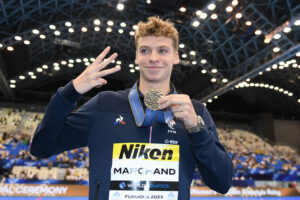
Leon Marchand, courtesy of Fabio Cetti
In no way does that diminish Marchand’s performance at these World Championships–the Frenchman was simply spectacular. On the first night of competition, Marchand took down Michael Phelps‘ last individual world record and the oldest one on the books, blazing 4:02.50 in the 400 IM.
Heading into the meet, there had been so much hype swirling around Marchand and that record. But, after he turned from breaststroke to freestyle, it was clear that he’d done it, as Phelps (who was calling the race on the NBC broadcast) said simply “it’s gone.”
Marchand didn’t rest on his laurels. Last year, he was named the male swimmer of the meet thanks to two golds (200 IM, 400 IM) and one silver (200 fly). In Fukuoka, he made the only upgrade he could; taking advantage of Kristof Milak‘s absence to strike gold in the 200 fly. There, Marchand clocked 1:52.43, making him the third-fastest performer all-time. He hit the same placement on the all-time rankings in the 200 IM, where he swam 1:54.82 for a new European record. Now he’s the third swimmer under 1:55, and the only person not named Phelps or Ryan Lochte to break that barrier.
Marchand has been riding a wave of momentum since the 2022 NCAAs, producing jaw-dropping swims in both yards and meters. It’s sure to be a confidence boost for Marchand, who’s set to be the face of the Paris Olympics. He said after his 400 IM that “the best is yet to come.” We learned a while ago that it’s a bad idea to put limits on Marchand Madness, and he could have something special in store for Paris.
1. Qin Haiyang, China (Individual: 3G, 1WR Relay: 1G, 1S)
China’s Qin Haiyang was the unexpected star of this meet. Before arriving in Fukuoka, the 24-year-old hadn’t won a long-course Worlds medal and was someone we’d pinned as a 200 breaststroke specialist. However, Qin defied all our expectations over the course of the eight-day meet.
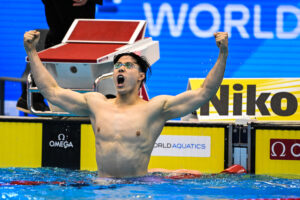
Qin Haiyang, courtesy of Fabio Cetti
In his first five swims, Qin set four Asian records. That includes through all three rounds of the 100 breast, where he picked up his first ever World title in 57.69, becoming the #2 performer all-time. He’d broken 58 seconds for the first time earlier that season with a 57.93 at Chinese Nationals, but we weren’t sure whether he (and the whole Chinese contingent) would be focused on Worlds or this fall’s Asian Games. Qin led the charge in showing decisively that China had not bypassed these World Championships.
Then, he turned his attention to the 50 breast. During the semifinals, he flirted with Adam Peaty‘s world record line, ripping a 26.20. The time was a new Asian record, and put him ahead of the field by a half-second. He was off that swim in the final, but swam a still speedy 26.29 for his second gold of the meet. Like the 100 breaststroke, he’s now the second fastest performer in history.
He was clear after both sprint breaststrokes that the world record is his dream. He didn’t achieve it in the sprints, but he got it done in the 200 breaststroke, breaking Zac Stubblety-Cook‘s world record with a 2:05.48. Qin took a very different strategy from Stubblety-Cook, because he knew that in his words, “for me, my strength is my speed, and I have very good confidence in my speed.”
He showed off that speed on two of China’s relays. He split 57-point in both the men’s and mixed medley relays. His fastest split was the 57.31 he swam on the mixed medley relay, helping China to their first gold in the event.
Qin completed a sweep in the 50/100/200 breaststroke, becoming the first person to sweep the 50, 100 and 200 in any stroke at Worlds. And for the first time, Peaty’s sprint breaststroke records look more than a little vulnerable.
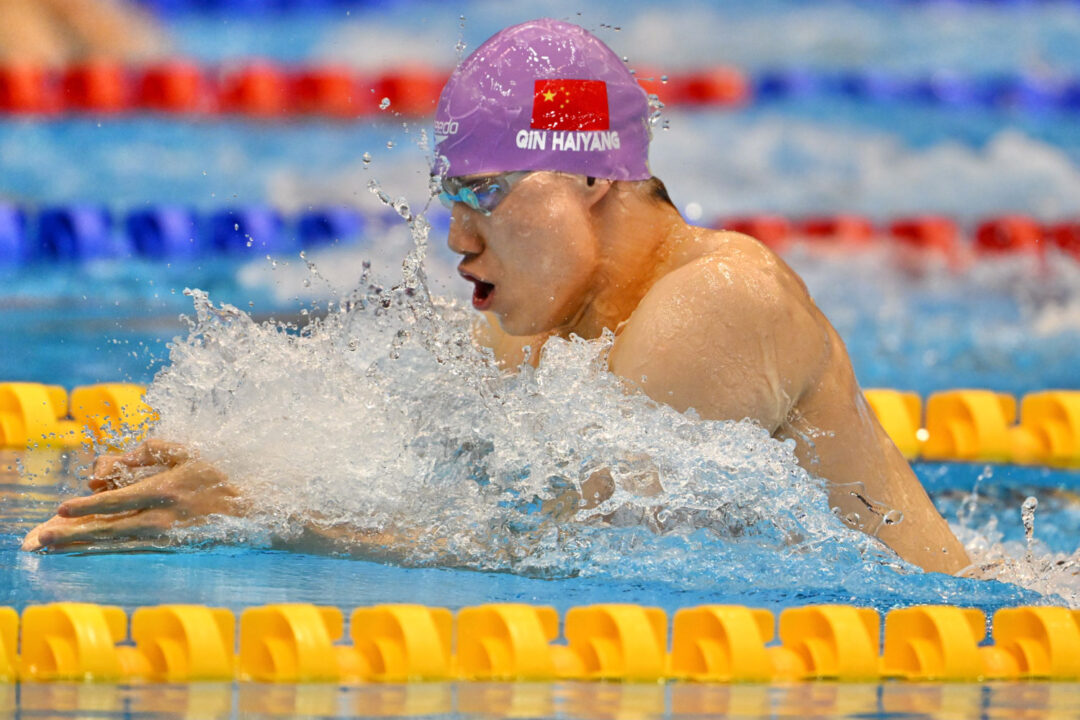
I think it is a bit odd to count medals won for swimming in relay prelims!
I’m thankful (and tbh a bit surprised) that very few people have gone in on the “Popovici is washed” narrative. Often times, we’re quick to dismiss other high-flying individuals.
I think (read: hope) its because everyone in the community recognizes that Popovici has only started to scratch the surface of his potential, and all of us collectively are hoping (read: waiting) to see how high his ceiling really is. Hopefully it’ll be next year
I’d forgotten that Sam Short is only 19! Exciting times ahead!
There’s definitely a bias in this list – either towards overweight relays which largely benefits swimmers from the US or just generally an American bias
While there’s nothing egregious, Alexy, Finke, Fink and Rose are all the highest point that I think you can conceivably argue for any of them
I think you could easily put in arguments that all of them should be a little lower. Ceccon should be in the list as an individual gold medalist.
If you take Rose, then Duncan Scott has a very similar record with an individual silver instead of bronze.
Yes, I also expected to see Duncan Scott there.
Chalmers won 3 golds btw:
Sorry, just realised you put his individual and relay golds apart. Silly me!
I’d go along with that list. Agree also the top two are so close and couldn’t really argue very strongly against either order.
I would place Chalmers above Grousset and Short :
This dude is an absolute legend in the 100 free , he won every title possible. And he carried the whole australian relay team on his back to the podium
Agreed. 47.15 is more impressive than 50.14. And he was once again herculean anchoring the 4 x 100.
Nah 50.1 is way more impressive than 47.1
Only 4 guys have been faster than 50.1, compared to the 6 that have been faster than 47.15. It also doesn’t look as good bc 47.mid freestylers are everywhere now, whereas 50.mid 100 fliers are still pretty rare
yh but 49.2 is better than anything Chalmers split
1 Hafnaoui, because it’s freestyle
2 Marchand, highest points, oldest WR (although 3:40.08 is the real one), would have also won the 200 breast if he could have swam it
3 Qin
4 Short
5 Richards
6 Chalmers
7 McEvoy
8 Finke